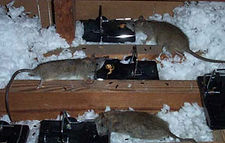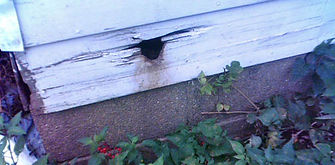Rat control devon & cornwall
Rat control devon & cornwall
Service - Rat Trapping & Removal
Part of the job means trapping and removing the rats. Trapping alone is by no means a total cure to your rat problem, but it is an essential part of the process. Sure, any person or pest company can set a few rat traps in the attic or home, but the real key to success is numbers and placement. We ensure total capture with these methods:
Number: we set MANY traps in the affected area to get them all.
Location: we set the traps ON the rat runways so they aren't bypassed. Touch: traps are set at just the right angles and levels of sensitivity.
-
Attic trapping with lethal snap traps
-
Attic trapping with non-lethal cage traps
-
Trapping behind crevices / appliances
-
Trapping inside the home with pet/child proof trapping stations
-
Trapping outside with cage traps or stations
Remember, rat control involves many important steps, from identifying and closing all of the entry areas, to sanitizing, to chemical deodorization. However, if there's rats, they've got to be trapped and removed. There's no magic spray or ultrasonic sound emitter that will make them leave. Even when the holes are all sealed, the rats that are stuck inside must be trapped and removed. Trapping is always part of the total rat control solution, and it must be done right. When an uneducated homeowner or a lazy pest control technician slaps a couple of traps around the attic hatch, that won't cut the mustard. Trapping is an art, and we at Dartmoor Pest Control have it mastered
Poison
One of the ways people try to control rat populations is through poison control. This is the primary method used by pest control companies that mostly deal with insects. I do NOT advocate the use of poison in controlling rats within a home. It is a silly, lazy, and ineffective way of dealing with a rat problem. Poison will only kill a % of the rats who eat it, and only a % of the rats will even eat it in the first place. Many rats will die, yes, and unfortunately, they will often die inside your attic or walls and cause a huge odor. Don't believe the users of poison who always claim, "oh no, the poison makes the rats thirsty, and they go outside to drink water, and once they drink water they swell up and die". That is a COMPLETE LIE. I know, because I've been to countless cases of dead rat removal in which poisons were applied by homeowners and pest control applicators. And even though poison does kill some rats, new rats will just keep coming and coming until the problem is solved correctly.
-
Poison does not get 100% of the rats - some don't eat it, some don't die.
-
Poison WILL result in stinking dead rats inside your attic or walls (see below)
-
Poison does not PERMANENTLY solve the problem - new rats can keep entering.
-
Poison is definitely less humane than a quick kill snap trap - if you care, anyway.
Look at this.
The homeowner and her insect control companies tried poison. For many months she dealt with horrible dead rat smells and the problem NEVER GOT SOLVED. I found 5 dead rats in her attic. Sure, rats were killed, but more and more kept coming, probably attracted to the smell of the dead rats and the poison bait. Then I came in and PERMANENTLY SOLVED the rat problem in just a few days. How? I performed a detailed inspection of the home, sealed all of the entry points with steel, removed the rats inside.
The only way to totally solve a rat problem is to permanently seal 100% of the entry points, and trap and remove the remaining rats. Poison simply doesn't work.
Repairs To Rat Entry Points
If you have rats in your home or loft, they are getting in somewhere, and usually several places. In order to keep them out permanently, all of the entry points into your home must be completely sealed and rat-proof. This is the area in which we truly excel, and it is why we are the best. We perform an extremely detailed inspection of the home in order to find every single entry point that the rodents are using. We use our years of experience in order to locate those tricky areas that rats can squeeze into - areas as small as 1/2 inch, and we seal them correctly.
.All of the trapping, poisoning, deodorizing spray, etc. in the world isn't as effective as
physically restricting the rats from entering the building. Repairs are an essential part
of rat control work, and the part that requires the most expertise and experience.
Believe me, we've been on jobs in years past in which the problem couldn't get
solved - until we found that last impossible to find and seal area. We have seen it all,
and we know how to find and seal every spot. Some companies just want to be lazy:
they set a few traps, or worse, set poison. Even the companies that say they can seal
the holes usually overlook many, many areas and do an inferior job. Get it done right,
and your problem will be 100% solved - PERMANENTLY.
How to Get Rid of Rats
I operate a professional rat removal business in Devon & Cornwall, where there's a lot of rats. I've seen hundreds of cases, and am an expert on getting rid of rats. The first and most important principle to know is that in order to completely and permanently solve the rat problem, you must stop any rats from getting inside the house in the first place. They're getting in somehow - they can use a lot of different entry points - vents, ducts, gaps in siding, architectural gaps in the eave and fascias, on the roof, under the house, etc. With our experience in rat control and knowledge of building architecture and how rats use it, we can do it completely, with guarantee. We perform a very detailed inspection of the house or building, and find every last spot that rats are using to get in. Once we've found everything, we seal it all up, with steel mesh and plating, that rats cannot chew back through. We make sure the place is entirely rat-proof. This is by far the most important step. Once this is done, then it's just a simple matter of trapping and removing the remaining rats, which is easy once they can't get outside for food and water, and the job is done. Well, it's also a good idea to have the attic cleaned and decontaminated and deodorized to kill off the parasites and the chance for Eosinophilic Meningitis, Leptospirosis or Salmonellosis, and to eliminate the phermone scent in rat grease and urine that will attract new rats to try to chew their way into the house.
It's also important to trap and remove the rats correctly. A lot of lazy companies will set a few traps by the attic hatch. That's not very effective. Rats are creatures of habit, and tend to travel the same pathways over and over. In order to catch them, it's best to set many traps, at least a dozen or more, on the exact trails in the attic that the rats are using. Poison is a horrible idea, as it leaves rat carcasses in the attic and walls, decomposing and giving off a terrible odor. Glue boards and other traps aren't very effective. Snap traps are best. As for other ideas for how to get rid of rats, people may recommend cleaning up rubbish, keeping the property free of waste and debris, keeping vegetation down, trimming back trees and other plants next to the house, and so on, but these things are not necessary. Sure, rubbish and debris and flora will attract rats, but the truth is that there's always going to be a lot of rats outside, even if you live in a very clean area, and there's no way to stop that. So the only real way to take care of a rat problem for good is to seal shut all entry points into the house, and let the rats live outside or in your neighbor's house, where they belong.


Tracking dust in drain. rat tail marks on right hand side

Sewer blocked from rat digging in drain

rat making nose in wall inside property

Tracking dust in drain. rat tail marks on right hand side












